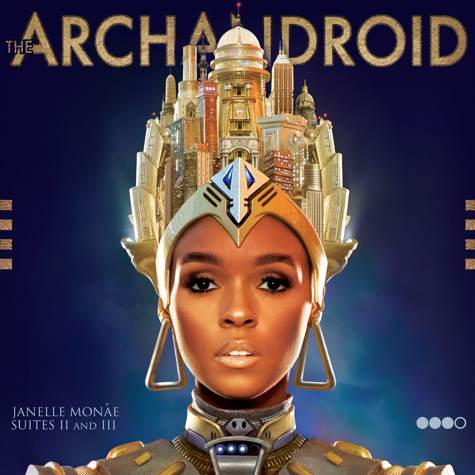Each week, Frequency Rotation examines a different song with a speculative-fiction theme. Genre, musical quality, and overall seriousness may vary.
Everyone from Gary Numan to Daft Punk has written songs about androids. Predictably, many of these songs sound like androids made them—as if synthesizers, vocoders, and mechanistic instrumentation were prerequisites for making music about men made of metal. But R&B prodigy Janelle Monáe—who, at the age of 24, already has a Grammy nomination and considerable amount of well-earned buzz under her belt—has raised the robotic bar with her new full-length, The ArchAndroid.
The disc is a gorgeous, allegorical concept album that, in a nutshell, tells the tale of a futuristic society in which androids are a repressed ethnic class on the cusp of discovering their own consciousness and identity. But rather than forcing form to follow function, Monáe gives the album a mostly organic rather than cybernetic feel—a delicate, moody, at times even Classical atmosphere that complements the programmed beats and sporadic digital flourishes. Humanized, even tenderized, Monáe’s sprawling story-songs echo her basic themes: That people, for better or for worse, must make a moral decision to see (or not see) humanity in whomever or whatever they want.
Radiohead famously took a similar approach with its 1999 hit, “Paranoid Android,” but Monáe gives herself an entire album to flesh out the fleshless, and in doing so crafts a parable about love, hatred, salvation, and human evolution that just as nimbly sidesteps cartooniness and cliché. Monáe herself has said how indebted to the SF canon she is: In interviews she’s gushed about Philip K. Dick, The Matrix, Metropolis (a film she pays visual tribute to on the cover of The ArchAndroid), and most often Octavia E. Butler, a visionary writer whose ethnocentric SF clearly marks her as Monáe’s aesthetic godmother.
Accordingly, sympathetic author Nalo Hopkinson is a big Monáe fan—and, with a song titled “Neon Gumbo,” which could almost be the title of a long-lost Hopkinson short story, Monáe clearly loves her right back. As the following interview shows, though, Monáe isn’t dabbling in SF. She takes the stuff passionately and seriously.
As with many well-executed concept albums, it can be tricky isolating one song from the rest of The ArchAndroid—but Monáe is a pop artist above all else, so she knows how to make chapters of an extended narrative feel like self-contained singles. “Neon Valley Street,” one of the most lush and melodic tracks, isn’t a single per se, but it is an encapsulation of her ambitious, epic-wrapped-in-a-love-song style.
And guess what? Mindful of tradition even as she restlessly innovates, Monáe adds some good-old-fashioned robotic vocals into the chorus when she coldly yet soulfully intones: “We met alone, forbidden in the city / Running fast through time like Tubman and John Henry / But the time was wrong, illegal aliens moaned / It’s such a pity that the city’s just a danger zone / Atomic blues bombing hearts like Iraqis in Babylon / The droid control will take your soul and rate it, berate, slay it / You hate it and debate it, but you don’t get caught / An outlaw outrunning the law.” Instead of sounding kitschy or retro-futuristic, it’s chillingly relevant—and just plain haunting.
Jason Heller writes for The A.V. Club, plays guitar, and enjoys making up stories to gross himself out.










